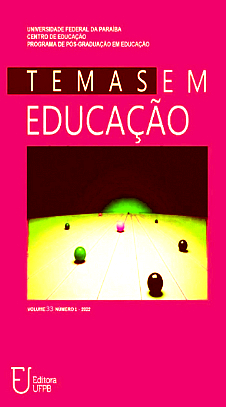THE DISCURSE HEGEMONY IN SECONDARY EDUCATION FOR BRAZILIAN YOUTHS
INNOVATIVE HIGHT SCHOOL PROGRAM/ YOUTH OF THE FUTURE PROJECT
DOI:
https://doi.org/10.22478/ufpb.2359-7003.2024v33n1.68626Keywords:
High school, Youths, CurriculumAbstract
The student occupation movements of 2016 contradict the premise of mere disinterest among Brazilian youths in secondary education. If that were the case, we wouldn't have heard echoes of demands for maintenance, increased access, quality, and greater participation in shaping the school space across different states of the federation. In this text, we present neoliberal discourses unveiled within the curricular production of the Innovative High School Program (ProEMI) (BRAZIL, 2009, 2009a, 2009b, 2009c) for Brazilian secondary education, guided by the analysis of the key concept: hegemony. The analyses indicate that within the realm of civil society, especially in the educational sphere, dominant forces, equipped with capital, develop strategies to educate towards consensus. The Brazilian State, acting as an educating entity, reshapes its practices through a pedagogy of hegemony articulated within curricular texts/documents aligned with the neoliberal project of sociability. In the educational field, hegemonic relations, as an exercise of direction and domination through power, are essentially pedagogical relationships, that is, of teaching and learning, while also promoting educational restructuring.
Downloads
References
APPLE, Michael. Educando à Direita: mercados, padrões, Deus e desigualdade. São Paulo: Editora Cortez, Instituto Paulo Freire, 2003.
BARROSO, João. O Estado, a educação e a regulação das políticas públicas. Educação e Sociedade, Campinas, v. 26, n. 92, p. 725-751, out. 2005.
BOURDIEU, Pierre. O poder simbólico. 15. ed. Rio de Janeiro: Bertrand do Brasil; 2011.
BRASIL. Conselho Nacional de Educação; Conselho Pleno. Parecer nº 11, de 30 de junho de 2009. Proposta de experiência curricular inovadora do Ensino Médio. Diário Oficial da União, Brasília, 25 de agosto de 2009, Seção 1, p. 11. Disponível em: <http://portal.mec.gov.br/index.php?option=com_docman&view=download&alias=1685-pcp011-09-pdf&category_ slug=documentos-pdf&Itemid=30192>. Acesso em: 27 fev. 2018.
INSTITUTO UNIBANCO. Relatório de Atividades 2009. São Paulo, 2009. Disponível em: <https://www.institutounibanco.org.br/wp-content/uploads/2016/08/rel_atividades_IU_2009.pdf>. Acesso em: 24 mar. 2020.
INSTITUTO UNIBANCO. Relatório de Atividades 2010. Disponível em: <https://www.institutounibanco.org.br/wp-content/uploads/2016/08/rel_atividades_IU_2010.pdf>. Acesso em: 24 mar. 2020.
INSTITUTO UNIBANCO. Relatório de Atividades 2011. Disponível em: <https://www.institutounibanco.org.br/wp-content/uploads/2016/08/rel_atividades_IU_2011.pdf>. Acesso em: 24 mar. 2020.
INSTITUTO UNIBANCO. Relatório de Atividades 2012. Disponível em: <https://www.institutounibanco.org.br/wp-content/uploads/2016/08/rel_atividades_2012.pdf>. Acesso em: 24 mar. 2020.
INSTITUTO UNIBANCO. Relatório de Atividades 2013. Disponível em: <https://www.institutounibanco.org.br/wp-content/uploads/2016/08/Relatorio-2013-InstitutoUnibanco.pdf>. Acesso em: 24 mar. 2020.
INSTITUTO UNIBANCO. Relatório de Atividades 2014. Disponível em: <https://www.institutounibanco.org.br/wp-content/uploads/2016/08/relatorio-2014-1.pdf>. Acesso em: 24 mar. 2020.
INSTITUTO UNIBANCO. Relatório de Atividades 2015. Disponível em: <https://www.institutounibanco.org.br/wp-content/uploads/2016/08/Relatorio-2015-InstitutoUnibanco.pdf>. Acesso em: 24 mar. 2020.
INSTITUTO UNIBANCO. Relatório de Atividades 2016. Disponível em: <https://www.institutounibanco.org.br/wp-content/uploads/2016/08/Relatorio-2015-InstitutoUnibanco.pdf>. Acesso em: 24 mar. 2020.
LAVAL, Christian. A Escola não é uma empresa. São Paulo: Editora Boitempo, 2019.
NEVES, Lúcia Maria Wanderley (Org.). A nova pedagogia da hegemonia. Estratégias do capital para educar o consenso. São Paulo: Xamã, 2005.
OLIVEIRA, Djalma de Pinho Rebouças. Planejamento Estratégico. 26. ed. São Paulo: Atlas, 2009.
SILVA, Mônica Ribeiro. (Org.). O Ensino Médio: suas políticas, suas práticas: estudos a partir do Programa Ensino Médio Inovador. Curitiba: UFPR/Setor de Educação, 2016. 154p.
SILVA, Monica Ribeiro da; JAKIMIU, Vanessa Campos de Lara. Do texto ao contexto: o Programa Ensino Médio Inovador em movimento. Ensaio: aval. pol. públ. educ. 2016, v.24, n.93, pp.910-938.
ZIBAS, Dagmar M. L. A reforma do ensino médio nos anos de 1990: o parto da montanha e as novas perspectivas. Revista Brasileira de Educação, n. 28, p. 24-36, Jan./Fev./Mar./Abr. 2005.
Downloads
Published
How to Cite
Issue
Section
License
Copyright (c) 2024 Revista Temas em Educação

This work is licensed under a Creative Commons Attribution 4.0 International License.
Authors who publish in this journal agree to the following terms:
. Authors retain the copyright and grant the journal the right to first publication, with the work simultaneously licensed under the Licença Creative Commons Attribution that allows the sharing of the work with acknowledgment of authorship and initial publication in this magazine. . Authors are authorized to assume additional contracts separately, for non-exclusive distribution of the version of the work published in this journal (eg, publishing in institutional repository or as a book chapter), with acknowledgment of authorship and initial publication in this journal.
. Authors are permitted and encouraged to publish and distribute their work online (eg in institutional repositories or on their personal page) at any point before or during the editorial process, as this can generate productive changes, as well as increase impact and citation of the published work (See O Efeito do Acesso Livre).



















